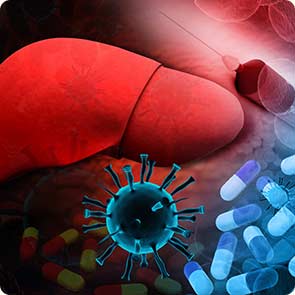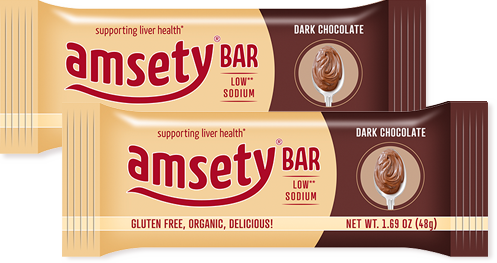High cholesterol can be caused by genetics, diet, obesity, or a combination of these factors6.
Learn how to control your cholesterol levels through healthy lifestyle changes.
The right diet to manage cholesterol levels
All cholesterol in food comes from animal or animal by-products, like meat, eggs, and dairy7.
Cholesterol levels in food do not translate exactly into blood cholesterol levels, although some
people respond more directly to cholesterol in food. In healthy adults, 300mg of cholesterol is
the recommended daily limit, while individuals at higher risk should limit cholesterol to 200mg
per day8. For reference, one egg, a high cholesterol food, contains 186mg of cholesterol.
Foods that helps lower LDL cholesterol include: whole wheat bread, vegetables, fruits, beans or lentils,
salmon, tofu, olive oil, pistachios, walnuts, almonds, avocados, and dark chocolate. Did you know that
moderate amounts of dark chocolate may benefit liver health? Find out
how.
Also check out Amsety’s recipes
that are prepared by San Diego Chef Chad Kilgore for a healthy liver diet!
Weight management and cholesterol levels
Being overweight increases LDL cholesterol (the “bad” cholesterol). However, losing weight can lower
LDL and even increase HDL cholesterol levels (the “good” cholesterol). Thus, maintaining a healthy
weight is enormously beneficial for stabilizing cholesterol.
Suzanne Steinbaum, M.D., Director at the Heart and Vascular Institute at Lenox Hill Hospital in New York,
emphasizes the importance of long term goals when switching to a healthy lifestyle. Often fad diets lead
to a crash and are non sustainable, therefore it is a slow but steady race.
Exercise and cholesterol levels
Exercising can lower LDL cholesterol (the “bad” cholesterol) and boost HDL cholesterol (the “good” cholesterol)
levels. Plus, exercise assists in healthy weight loss. Aim for 150 minutes of exercise per week, or
approximately 30 minutes a day most days of the week. Elevate your heart rate! Choose sports you enjoy
or start with brisk walks.
Smoking and cholesterol levels
The habit of smoking has numerous negative effects on your body, such as higher cholesterol levels.
Quitting smoking can decrease your cholesterol by as much as 10%. This also decreases the likelihood
of having heart disease. Those with high cholesterol, heart disease and lung cancer are advised that
the best thing they can do to be healthier is to quit smoking. According to Medical Daily, there are
several other benefits to quitting smoking such as clearer skin, brighter smile, and better hearing.


 (442) 244-5115
(442) 244-5115












